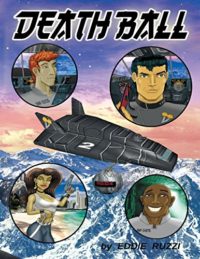Title: Death Ball
Author: Eddie Ruzzi
Publisher: Lulu Publishing Services
ISBN: 978-1-4834-7600-1
Pages: 166
Genre: Fiction
Reviewed by: Christa Hill
Hollywood Book Reviews
Death Ball by author Eddie Ruzzi is a retro style read with a video game feel. Ruzzi captures a lot of the magic of the 80’s with this easy to read space intergalactic story. The world of the story has a young sci-fi veneer that includes echoes of Orson Scott Cards Ender’s Game. The main characters have a largely dialogue based form of communication which leads the book to feel like a screenplay or comic book rather than a novel.
The writing and layout take the readers into the story, yet it is very rare and challenging for a story to be written in a past tense. This story has a vast amount of detail to explain complex new technologies and unusual occurrences which can, to some, difficult to grasp. With that said, the author has a vast amount of knowledge about sci-fi standards and space weapons which I found to be extremely delightful, educational and entertaining.
The romantic elements in this story are kept very PG-13, which keeps this story very well in line with a young teen audience. Since there are no vulgar use of language nor overly gratuitous images, this story is much easier to engage with than some other sci-fi stories which are marketed to younger audiences.
Ruzzi writes in an expansive way that totally promotes sci-fi. Science fiction is a very complex genre and I would say that this story keeps the science to a minimum which allows it to please a broader reading public. I was entertained by this book and I felt that it would be a very good read for young teens that struggle to read over watching TV.
Death Ball is an excellent mix of quick entertainment, vivid images and fun reading. For more mature audiences the setup feels a little familiar. Ruzzi brings the whole story full circle opening on a problem and closing with the conclusion of the problem. I enjoyed the ending immensely; it gives a window into what the future will look like for all the characters that we have spent one-hundred pages with.

